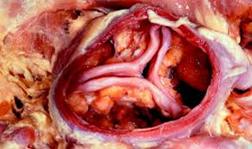 Yesterday the 2014 AHA/ACC Guidelines for the Management of Patients with Valvular Heart Disease were released. Last published as a full guideline in 2006 and updated in 2008 the new guideline occupies 235 pages and is supported by 939 references. The guideline development group have sifted, weighted and considered all the evidence and come up with 226 recommendations for you and me to follow. In this type of guideline the strength of evidence supporting each recommendation is graded as A, B or C. A recommendation supported by evidence graded as an A is derived from multiple randomised trials or meta-analyses, Evidence graded as B comes from a single randomised trial or more usually non-randomised trials and evidence graded as C is expert opinion. In this new guideline just 7 out of the 226 recommendations are supported by A grade evidence and of the remainder, over half (112 to be precise) are the product of just expert opinion. The 7 recommendations supported by top class evidence a straightforward enough. For example they recommend replacing the aortic valve in people with an indication for aortic valve replacement who have acceptable surgical risk, seems logical. They recommend treating patients with heart failure who also have mitral regurgitation with guideline directed medical therapy and using resynchronisation therapy for those who meet the indications for this treatment; again this seems logical and derives from clinical trials of heart failure rather than valve disease. They recommend giving warfarin to patients with mechanical prosthetic valves; Is there anyone who wouldn't do that? They also recommend giving aspirin in addition to warfarin to patients with mechanical valve prosthesis; I don't think that practice is very widespread even though it comes from a trial published in 1993. It seems cardiologist ignore some evidence when it suits them. They also recommend treating symptomatic severe mitral stenosis with balloon valvuloplasty provided there are no contraindications and tell us not to give statins to reduce progression of aortic stenosis - they don't work. Actually this latter recommendation is interesting since there were a large number of retrospective and case-controlled studies which indicated that statins reduced progression of aortic stenosis. When the blinded clinical trials were done however these drugs were without effect. What of the recommendations based on level B and C evidence. As the guideline document states just because the level of evidence is C does not necessarily mean that the evidence is weak but they would say that wouldn't they. In fairness some clinical questions are not suited to randomised clinical trials so I don't think there will ever be a trial to investigate whether taking blood cultures before antibiotics are given for endocarditis is appropriate or not. Currently the biggest challenge and difficult decision is when to refer asymptomatic patients for valve replacement or repair. The guideline helps us here recommending various cut-offs of left ventricular size and function but what of the evidence supporting these recommendations. Lets take one as an example: On page 56 the guideline says: Aortic valve replacement is reasonable for asymptomatic patients with severe aortic regurgitation and normal LV function (EF>50%) but with severe LV dilatation (LVESD >50mm or 25mm/m2). [Class IIb, Level B]. This recommendation is supported with evidence from three studies. The first (reference 226, Van Rossem et al), is an imaging study describing a comparison of MRI and angiography for the assessment of LV ejection fraction and it doesn't seem to have too much to do with when to operate for aortic regurgitation. The other two studies (Bonow et al, reference 243 and Gaasch et al, reference 244) are actually about aortic regurgitation which is a good start. The Bonow paper looked at 61 patients all with dilated ventricles who had an aortic valve replacement. They found that after the operation the diastolic dimensions decreased. In this study a third of the patients could not complete an exercise test to 8METS of workload so they were anything but asymptomatic and more importantly everyone got an operation so the study doesn't tell you when to operate. The other study was an extensive treatise on 31 patients with severe aortic regurgitation. In this study 23 had NYHA class 2 or 3 symptoms - so again not asymptomatic. The authors concluded that LV enlargement could be detected by echocardiography. Again not a study of when to operate. So these papers don't really support the guideline recommendation and we need to be cautious because there is a tendency for weak recommendations based on little evidence to gain strength when they enter a guideline. Guidelines are disseminated at meetings and internet presentations. Some people will read the executive summary, some will skim though the guideline document. Only a very few will read the guideline and then go back to the original studies that support the recommendations to evaluate them in detail - we assume the guidelines development group will have done due diligence. Although we chant the mantra of evidence based medicine in many cases we are still practicing eminence based medicine.
0 Comments
|
Dr Richard BogleThe opinions expressed in this blog are strictly those of the author and should not be construed as the opinion or policy of my employers nor recommendations for your care or anyone else's. Always seek professional guidance instead. Archives
August 2023
Categories
All
|
 RSS Feed
RSS Feed

